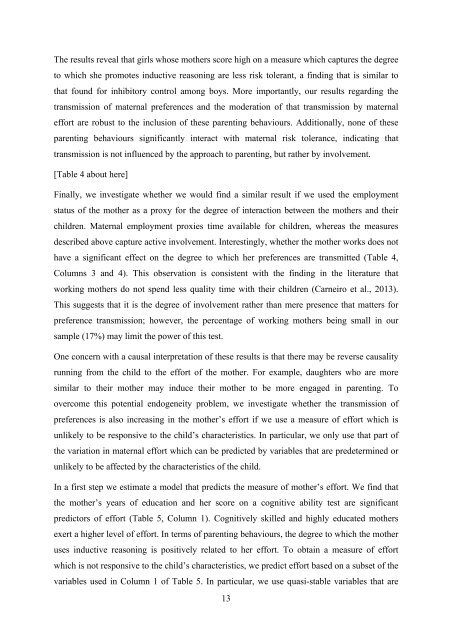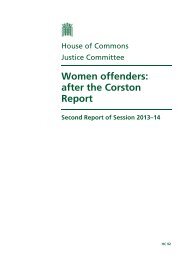Parental socialisation effort and the intergenerational transmission ...
Parental socialisation effort and the intergenerational transmission ...
Parental socialisation effort and the intergenerational transmission ...
- No tags were found...
You also want an ePaper? Increase the reach of your titles
YUMPU automatically turns print PDFs into web optimized ePapers that Google loves.
The results reveal that girls whose mo<strong>the</strong>rs score high on a measure which captures <strong>the</strong> degreeto which she promotes inductive reasoning are less risk tolerant, a finding that is similar tothat found for inhibitory control among boys. More importantly, our results regarding <strong>the</strong><strong>transmission</strong> of maternal preferences <strong>and</strong> <strong>the</strong> moderation of that <strong>transmission</strong> by maternal<strong>effort</strong> are robust to <strong>the</strong> inclusion of <strong>the</strong>se parenting behaviours. Additionally, none of <strong>the</strong>separenting behaviours significantly interact with maternal risk tolerance, indicating that<strong>transmission</strong> is not influenced by <strong>the</strong> approach to parenting, but ra<strong>the</strong>r by involvement.[Table 4 about here]Finally, we investigate whe<strong>the</strong>r we would find a similar result if we used <strong>the</strong> employmentstatus of <strong>the</strong> mo<strong>the</strong>r as a proxy for <strong>the</strong> degree of interaction between <strong>the</strong> mo<strong>the</strong>rs <strong>and</strong> <strong>the</strong>irchildren. Maternal employment proxies time available for children, whereas <strong>the</strong> measuresdescribed above capture active involvement. Interestingly, whe<strong>the</strong>r <strong>the</strong> mo<strong>the</strong>r works does nothave a significant effect on <strong>the</strong> degree to which her preferences are transmitted (Table 4,Columns 3 <strong>and</strong> 4). This observation is consistent with <strong>the</strong> finding in <strong>the</strong> literature thatworking mo<strong>the</strong>rs do not spend less quality time with <strong>the</strong>ir children (Carneiro et al., 2013).This suggests that it is <strong>the</strong> degree of involvement ra<strong>the</strong>r than mere presence that matters forpreference <strong>transmission</strong>; however, <strong>the</strong> percentage of working mo<strong>the</strong>rs being small in oursample (17%) may limit <strong>the</strong> power of this test.One concern with a causal interpretation of <strong>the</strong>se results is that <strong>the</strong>re may be reverse causalityrunning from <strong>the</strong> child to <strong>the</strong> <strong>effort</strong> of <strong>the</strong> mo<strong>the</strong>r. For example, daughters who are moresimilar to <strong>the</strong>ir mo<strong>the</strong>r may induce <strong>the</strong>ir mo<strong>the</strong>r to be more engaged in parenting. Toovercome this potential endogeneity problem, we investigate whe<strong>the</strong>r <strong>the</strong> <strong>transmission</strong> ofpreferences is also increasing in <strong>the</strong> mo<strong>the</strong>r’s <strong>effort</strong> if we use a measure of <strong>effort</strong> which isunlikely to be responsive to <strong>the</strong> child’s characteristics. In particular, we only use that part of<strong>the</strong> variation in maternal <strong>effort</strong> which can be predicted by variables that are predetermined orunlikely to be affected by <strong>the</strong> characteristics of <strong>the</strong> child.In a first step we estimate a model that predicts <strong>the</strong> measure of mo<strong>the</strong>r’s <strong>effort</strong>. We find that<strong>the</strong> mo<strong>the</strong>r’s years of education <strong>and</strong> her score on a cognitive ability test are significantpredictors of <strong>effort</strong> (Table 5, Column 1). Cognitively skilled <strong>and</strong> highly educated mo<strong>the</strong>rsexert a higher level of <strong>effort</strong>. In terms of parenting behaviours, <strong>the</strong> degree to which <strong>the</strong> mo<strong>the</strong>ruses inductive reasoning is positively related to her <strong>effort</strong>. To obtain a measure of <strong>effort</strong>which is not responsive to <strong>the</strong> child’s characteristics, we predict <strong>effort</strong> based on a subset of <strong>the</strong>variables used in Column 1 of Table 5. In particular, we use quasi-stable variables that are13
















